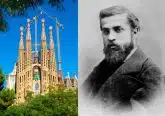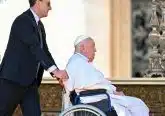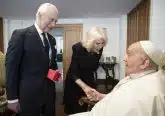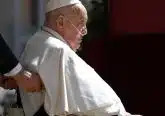Where is Pope Francis going in Iraq and why? A CNA Explainer
by Courtney Mares
Rome Newsroom, Feb 25, 2021 / 12:00 pm MT (CNA).- In a week’s time, Pope Francis is expected to make history by becoming the first pope to travel to Iraq. His March 5-8 trip will take him from excavations of historical biblical sites dating back thousands of years to churches where Catholics suffered horrific terrorist attacks only a few years ago.
With meetings planned with Iraqi political leaders and prominent Muslim clerics, the pope is scheduled to travel 900 miles within Iraq in a little over three days.
Here is a breakdown of the places where Pope Francis is scheduled to visit in Iraq.
Friday, March 5: Baghdad
Speech at Presidential Palace
Upon arrival at Baghdad International Airport, the pope is scheduled to meet with Iraqi Prime Minister Mustafa Al-Kadhimi at the airport before visiting Iraqi President Barham Salih at the presidential palace, where the pope will give a speech to a gathering of civil authorities.
The pope’s meetings with Iraqi authorities come at a time when the country is facing severe political, socioeconomic, and security challenges, including a protest movement calling for an end to government corruption, high levels of unemployment, and the sectarian divisions within the political system established after the U.S.-led invasion of Iraq in 2003.
Cathedral Our Lady of Salvation
The Syriac Catholic Cathedral of Our Lady of Salvation, also known as Sayidat al-Nejat, was the site of a suicide attack by the Islamic State during Sunday Mass in 2010 in which more than 50 people were killed.
The terrorists killed two priests and took more than 100 hostages before Iraqi security forces stormed the church with the support of U.S. forces. The beatification process of the 48 Catholics who died inside the church advanced from the diocesan phase to the Vatican in October 2019.
The cathedral was also one of six churches bombed in August 2004 when five car bombs in Baghdad and one in Mosul were detonated in cars parked outside churches, killing a total of 12 people and injuring more than 70.
Pope Francis will visit the cathedral and give a speech to local bishops, priests, religious, and other Iraqi Catholics.
A mural of the pope with Vatican and Iraqi flags has been painted on a wall outside of the cathedral in anticipation of the pope’s visit, according to photos posted on social media.
Saturday, March 6: Najaf and the Plain of Ur
Meeting with Shiite Cleric in Najaf
On his second day in Iraq, Pope Francis will travel on Iraqi Airways to Najaf to meet with Ali al-Sistani, an influential leader of Shiite Muslims in Iraq.
Najaf is considered one of the most sacred pilgrimage sites in Shiite Islam, after only Mecca and Medina. It is the burial place of Imam Ali ibn Abi Talib, the son-in-law of Muhammad and the first Shiite imam. The question of Ali’s right to the caliphate resulted in the major schism between Sunni and Shiite Muslims.
Not far from Najaf is the tomb of the prophet Ezekiel in Al Kifl, where the historic Jewish synagogue at the site is now contained within a newly built Shiite mosque.
Interreligious Meeting in the Plain of Ur
Pope Francis will then travel to the plain of Ur in southern Iraq, which the Bible records as the birthplace of Abraham. The archaeological site at Ur, excavated in the 20th century, includes a Mesopotamian ziggurat and ancient complex of houses.
The pope plans to give a speech at an interreligious gathering in Ur because of the importance of Abraham for all three major monotheistic religions. In Judaism, Abraham is revered as the first patriarch of the Jewish people. Muslims believe that Muhammad is a descendent of Abraham’s son Ishmael.
Chaldean Cathedral of St. Joseph in Baghdad
Pope Francis will end the day with Mass at the Chaldean Catholic Cathedral of St. Joseph, upon his return to Baghdad. The cathedral, called Mar Yousef, was built in the 1950s. It was recently restored by Chaldean Patriarch Louis Raphaël Sako.
The Chaldeans are one of several Eastern Catholic communities found in Iraq. Tracing back their history to the early Christians through their connection with the Church of the East, Chaldeans made up two-thirds of Iraqi Christians before the population was diminished by Islamic State violence. Other Eastern Rite communities in Iraq include Syriac Catholics, Armenian Catholics, and Melkite Greek Catholics.
Sunday, March 7: Mosul and the Nineveh Plains
Memorial in Mosul
Pope Francis will spend his final full day in Iraq in the northern Nineveh Plains, where the Islamic State carried out a genocidal campaign against Christians, Yazidis, and other minority groups after taking Mosul in the summer of 2014.
The pope will be welcomed at the Erbil Airport by the religious and civil authorities of Iraqi Kurdistan before traveling by helicopter to Mosul, where he will pray for the victims of war at Hosh al-Bieaa square.
Immaculate Conception Cathedral in Bakhdida
Pope Francis will then travel by helicopter to visit the local Christian community in Bakhdida, also known as Qaraqosh, at the Syriac Catholic Immaculate Conception Cathedral, where he will pray the Angelus.
The cathedral, also known as Al-Tahira Cathedral, was desecrated and its interior was charred after the Islamic State set it aflame after taking control of the town in 2014. Restoration of the cathedral was recently completed by Aid to the Church in Need. A new Marian statue sculpted by a local Christian artist was placed atop the bell tower in January.
Stadium Mass in Erbil
On his last evening in Iraq, Pope Francis will offer Mass at the Franso Hariri International Stadium in Erbil on March 7. This Mass is expected to be the largest gathering of Iraqi Catholics with the pope during his trip.
Local authorities in Kurdistan have said that 4,500 people have registered for the Mass. A special identification card issued by Erbil’s Catholic University will be required to enter the stadium for the Mass.
Monday, March 8: Travel back from Baghdad to Rome
After a farewell ceremony on Monday morning at the Baghdad International Airport, Pope Francis will fly back to Rome on Alitalia, traveling 1,800 miles in just over five hours. The pope will answer journalists’ questions during a press conference on his return flight.
Chaldean Catholic Archbishop Bashar Warda told CNA that Pope Francis’ upcoming visit to the region could be a turning point for the country’s diminished Christian population.
“It has the potential to change the trajectory of the Christian presence in Iraq from one of a disappearing people to one of a surviving and thriving people,” the Archbishop of Erbil said.













